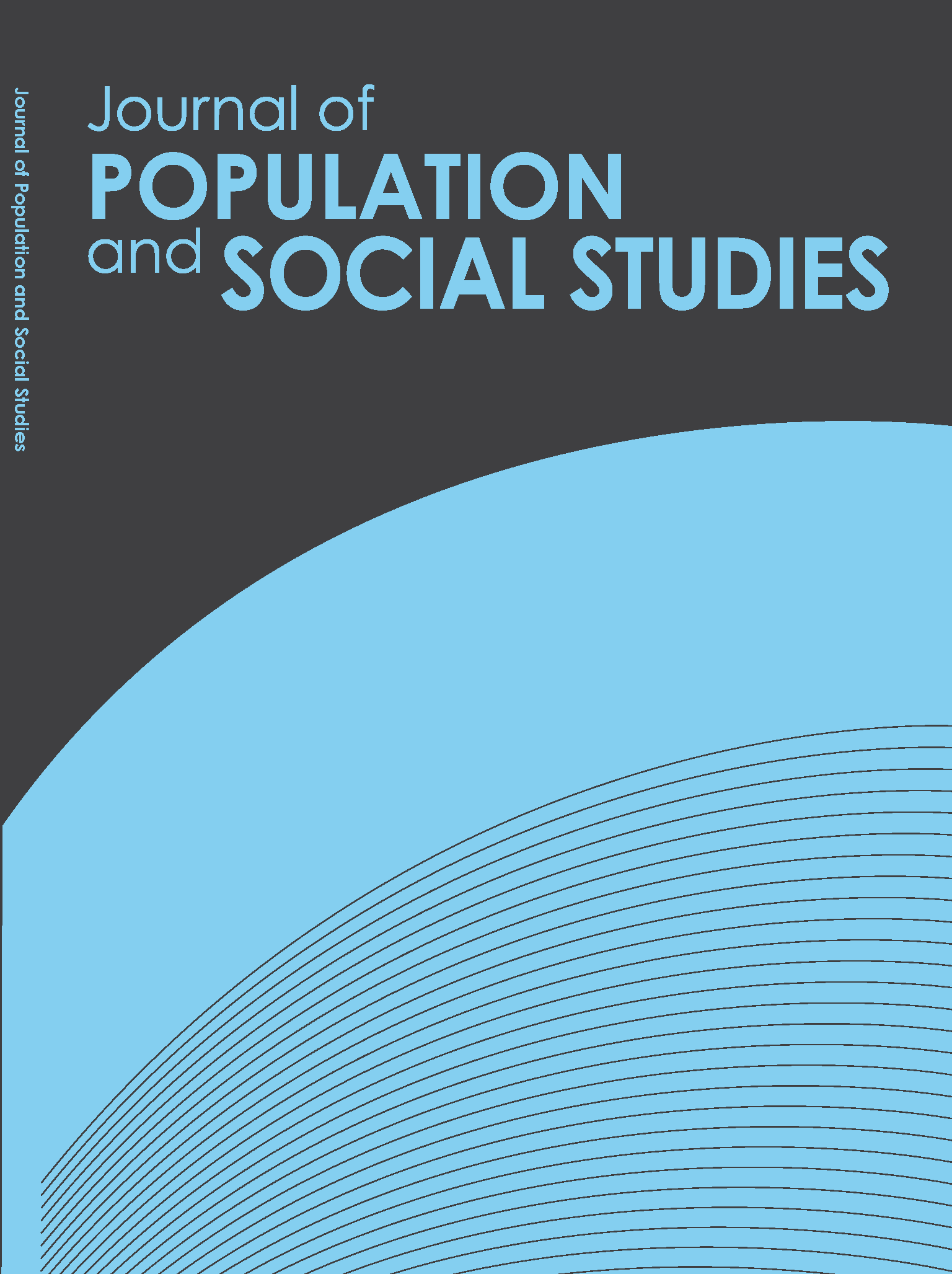Challenges of Labor Migrants to Thailand: Issues of Bilateral Agreements for the Employment of Workers in the Greater Mekong Subregion (GMS)
Main Article Content
Abstract
The governments of the Kingdom of Thailand and neighboring countries have, over the past years, attempted to legalize the flow of migrant workers. Bilateral agreements for the Employment of Workers were signed between Thailand and its Greater Mekong Subregion (GMS) partners from 2002-2004 to promote cooperation for the employment of workers. The roles of both migrant-sending and migrant-receiving countries have to be made clear in terms of how to cooperate in safe migration, and how to exchange information about standard practices and decent working environments for migrant workers. This framework was designed to facilitate migrants and prospective migrants in securing documents and entering into a two-year guest worker program. This paper aims to examine, based on empirical data consisting of 97 semi-structured interviews with migrant workers in the Kingdom of Cambodia, Lao People’s Democratic Republic, and Republic of the Union of Myanmar, the challenges migrants face in facilitating legal work in the GMS under bilateral agreements. This paper analyzes, by employing a rights-based approach to migration issues, the obstacles migrants face in seeking legal work in these regions. The findings of the study indicated four main issues related to migration under the current governance system. Based on the results, the researcher has suggested the development of laws or measures in both the migrant-sending country and Thailand, the migrant-receiving country, which specify the costs and duration of the process to import labor. It is essential that all personnel give consistent information to interested persons and improve pre-departure training courses to help migrant workers understand the specifications in the bilateral MOUs with Thailand. This knowledge and information should be provided to migrants, prospective migrants, their families, and relevant agencies in both countries.
Article Details

This work is licensed under a Creative Commons Attribution-NonCommercial-NoDerivatives 4.0 International License.
References
• Amnesty International. (2009). Disposable labor: Rights of migrant workers in South Korea. http://www.amnesty.org/en/library/asset/ASA25/001/2009/en/8bc729f6-39d7-4ce9-aeab-86eea173451c/asa250012009en.pdf.
• Arnold, G. (2012). Migration: Changing the world. Pluto Press.
• Asian Development Bank. (ADB). (2013). Facilitating safe labor migration in the Greater Mekong Subregion issues, challenges, and forward-looking interventions. Philippines: Asian Development Bank.
• Bertocchi, G., & Strozzi, C. (2008). International migration and the role of institutions. Public
• Choice, 137(1/2), 81-102. https://www.jstor.org/stable/40270852
• Boswell, C. (2007). Theorizing migration policy: Is there a third way? International Migration
• Review.41(91), 75-100. https://doi.org/10.1111/j.1747-7379.2007.00057.x
• Castles, S. (2002). Migration and community formation under conditions of globalization, International Migration Review. 36(4), 1143-1168. https://www.jstor.org/stable/4149495
• Castles, S. (2004). The factors that make and unmake migration policies. International Migration
• Review. 38(3), 852-884. https://www.jstor.org/stable/27645419
• Chantavanich, S., & Jayagupta, R. (2010). Immigration to Thailand: The case of migrant
• workers from Myanmar, Laos, and Cambodia. In Segal U.A., Elliot D., Mayadas N.S., editors. Immigration worldwide: Policies, practices, and trends. Oxford: Oxford Scholarship Online. https://doi.org/10.1093/acprof:oso/9780195388138.003.0020
• Chantavanich, S., & Vungsiriphisal, P. (2012). Myanmar migrants to Thailand: Economic
• analysis and implications to Myanmar development in economic reforms in Myanmar: Pathways and prospects, edited by Hank Lim and Yasuhiro Yamada, BRC Research Report No.10. Bangkok: Bangkok Research Center, IDE-JETRO, Thailand. https://www.ide.go.jp/library/English/Publish/Download/Brc/pdf/10_06.pdf.
• Guarnizo, L. E., Portes, A., & Haller, W. J. (2003). Assimilation and transnationalism:
• Determinants of transnational political action among contemporary migrants. American Journal of Sociology, 108(6), 1211-1248. https://www.jstor.org/stable/10.1086/375195
• Guild, E. (2017). The UN’s search for a global compact on safe, orderly, and regular migration. German Law Journal, 8(7), 1779-1796. https://hdl.handle.net/2066/180874
• Hammar, T. V. (1990). Democracy and the nation state. Aliens, denizens, and citizens in a world of international migration. England: Aldershot.
• Hammar, T. V. (1985). European immigration policy: A comparative study. Cambridge:
• Cambridge University Press.
• Huguet, J. W. (2008). Do international migration policies in Thailand achieve their objectives? Bangkok: International Labor Organization (ILO). https://www.ilo.org/wcmsp5/groups/public/---asia/---ro-bangkok/documents/publication/wcms_160585.pdf
• Huguet, J. W., & Chamratrithirong, A. (2011). Thailand migration report 2011. Bangkok: International Organization for Migration (IOM). https://reliefweb.int/sites/reliefweb.int/files/resources/TMR-2011.pdf
• Huguet, J. W., & Punpuing, S. (2005). International migration in Thailand. Bangkok: International Organization for Migration. https://publications.iom.int/system/files/pdf/intl_migration_thailand.pdf
• International Labor Organization (ILO). (2020). Endline research findings on fishers and seafood workers in Thailand. Geneva: International Labor Organization (ILO). https://shiptoshorerights.org/wp-content/uploads/Endline-Research-Findings-on-Fishers-and-Seafood-Workers-in-Thailand_EN.pdf
• International Labor Organization (ILO). (2015). Review of the effectiveness of the MOUs in
• managing labor migration between Thailand and neighbouring countries. Bangkok: International Labor Organization Regional Office for Asia and the Pacific. http://un-act.org/publication/view/review-of-the-effectiveness-of-the-mous-in-managing-labour-migration-between-thailand-and-neighbouring-countries/
• International Organization for Migration (IOM). (2011). Thailand migration report 2011. Thailand: International Organization for Migration (IOM). https://reliefweb.int/sites/reliefweb.int/files/resources/TMR-2011.pdf
• Meyers, E. (2000). Theories of international immigration policy: A comparative analysis.
• International Migration Review, 34 (4), 1245-1282. https://www.jstor.org/stable/2675981
• Meyers, E. (2002). The causes of convergence in Western immigration control. Review of
• International Studies, 28(1), 123-141. https://www.jstor.org/stable/20097782
• Office of Foreign Workers Administration, Department of Employment, Ministry of Labor,
• Thailand. (2019). Statistical tables for the foreign labor situation as of September 2019.
• https://www.doe.go.th/prd/assets/upload/files/alien_th/7b0d583df7ce92f43760c3d07c6ee66f.pdf.
• Piper, N. (2004). Gender and migration policies in Southeast and East Asia: Legal protection
• and socio-cultural employment of unskilled migrant women. Singapore Journal of
• Tropical Geography, 25(2), 216-231. https://doi.org/10.1111/j.0129-7619.2004.00183.x
• Piper, N. (2017). Global governance of labor migration: From ‘management’ of migration to an
• integrated rights-based approach. In Regulatory Theory: Foundations and applications edited by Peter Drahos, pp. 375-392. http://press-files.anu.edu.au/downloads/press/n2304/pdf/ch22.pdf
• Piper, N., Rosewarne, S., & Withers, M. (2017). Debate migrant precarity in Asia: ‘Networks of
• Labor Activism’ for a rights-based governance of migration. Development and Change 48(5), 1089–1110. https://doi.org/10.1111/dech.12337
• Ruhs, M., & P. Martin. (2008). Numbers vs. rights: Trade-offs and guest worker
• programs. International Migration Review, 42(1), 249-265. https://www.jstor.org/stable/27645722
• Russell, S. S. (1989). Politics and ideology in migration policy formulation: The case of Kuwait.
• International Migration Review, 23(1), 24-47. https://www.jstor.org/stable/2546181
• Skrentny, J. D., Chan, S., Fox, J., & Kim, D. (2007). Defining nations in Asia and Europe: A comparative analysis of ethnic return migration policy. International Migration Review, 41(4), 793-825. https://doi.org/10.1111%2Fj.1747-7379.2007.00100.x


